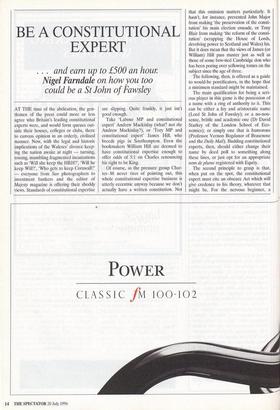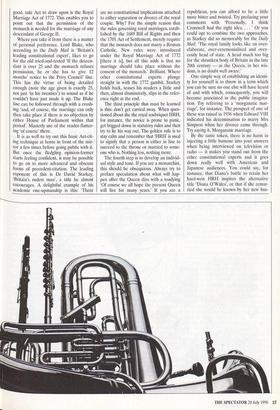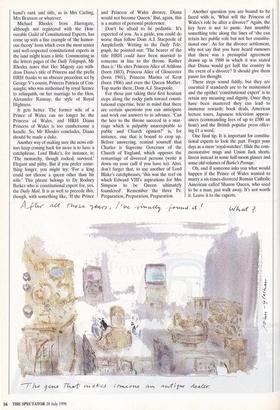BE A CONSTITUTIONAL EXPERT
. . . and earn up to £500 an hour. Nigel Farndale on how you too could be a St John of Fawsley
AT THE time of the abdication, the gen- tlemen of the press could more or less agree who Britain's leading constitutional experts were, and would form queues out- side their houses, colleges or clubs, there to canvass opinion in an orderly, civilised manner. Now, with the legal and historic implications of the Waleses' divorce keep- ing the nation awake at night — turning, tossing, mumbling fragmented incantations such as Will she keep the HRH?', Will he keep Will?', 'Who gets to keep Cornwall?' — everyone from Sun photographers to investment bankers and the editor of Majesty magazine is offering their shoddy views. Standards of constitutional expertise AT THE time of the abdication, the gen- tlemen of the press could more or less agree who Britain's leading constitutional experts were, and would form queues out- side their houses, colleges or clubs, there to canvass opinion in an orderly, civilised manner. Now, with the legal and historic implications of the Waleses' divorce keep- ing the nation awake at night — turning, tossing, mumbling fragmented incantations such as Will she keep the HRH?', Will he keep Will?', 'Who gets to keep Cornwall?' — everyone from Sun photographers to investment bankers and the editor of Majesty magazine is offering their shoddy views. Standards of constitutional expertise are slipping. Quite frankly, it just isn't good enough.
Take 'Labour MP and constitutional expert' Andrew Mackinlay (what? not the Andrew Mackinlay?), or 'Tory MP and constitutional expert' James Hill, who breeds pigs in Southampton. Even the bookmakers William Hill are deemed to have constitutional expertise enough to offer odds of 5:1 on Charles renouncing his right to be King.
Of course, as the pressure group Char- ter- 88 never tires of pointing out, this whole constitutional expertise business is utterly eccentric anyway because we don't actually have a written constitution. Not that this omission matters particularly. It hasn't, for instance, prevented John Major from making 'the preservation of the consti- tution' his main election crusade, or Tony Blair from making 'the reform of the consti- tution' (scrapping the House of Lords, devolving power to Scotland and Wales) his. But it does mean that the views of James (or William) Hill pass muster just as well as those of some bow-tied Cambridge don who has been poring over yellowing tomes on the subject since the age of three.
The following, then, is offered as a guide to would-be pontificators, in the hope that a minimum standard might be maintained. The main qualification for being a seri- ous player in this game is the possession of a name with a ring of authority to it. This can be either a fey and aristocratic name (Lord St John of Fawsley); or a no-non- sense, brittle and academic one (Dr David Starkey of the London School of Eco- nomics); or simply one that is humorous (Professor Vernon Bogdanor of Brasenose and the Daily Mail). Budding constitutional experts, then, should either change their name by deed poll to something along these lines, or just opt for an appropriate nom de plume registered with Equity.
The second principle to grasp is that, when put on the spot, the constitutional expert must cite an obscure Act which will give credence to his theory, whatever that might be. For the nervous beginner, a good, safe Act to draw upon is the Royal Marriage Act of 1772. This enables you to point out that the permission of the monarch is needed for the marriage of any descendant of George II.
Where you take it from there is a matter of personal preference. Lord Blake, who according to the Daily Mail is `Britain's leading constitutional expert', likes to go for the old tried-and-tested `If the descen- dant is over 25 and the monarch refuses permission, he or she has to give 12 months' notice to the Privy Council' line. This has the virtue of being detailed enough (note the age given is exactly 25, not just `in his twenties') to sound as if he couldn't have just made it up. The Blake line can be followed through with a crush- ing 'and, of course, the marriage can only then take place if there is no objection by either House of Parliament within that period'. Masterly use of the reader-flatter- ing 'of course' there.
It is as well to try out this basic Act-cit- ing technique at home in front of the mir- ror a few times before going public with it. But once the fledgling opinion-former starts feeling confident, it may be possible to go on to more advanced and obscure forms of precedent-citation. The leading exponent of this is Dr David Starkey, `Britain's rudest man', a title he almost encourages. A delightful example of his academic one-upmanship is this: 'There are no constitutional implications attached to either separation or divorce of the royal couple. Why? For the simple reason that the rules governing royal marriages, estab- lished by the 1689 Bill of Rights and then the 1701 Act of Settlement, merely require that the monarch does not marry a Roman Catholic. New rules were introduced under the Royal Marriage Act of 1772 [there it is], but all this adds is that no marriage should take place without the consent of the monarch.' Brilliant. Where other constitutional experts plunge straight in with the 1772 gambit, Starkey holds back, teases his readers a little and then, almost dismissively, slips in the refer- ence right at the end.
The third principle that must be learned is this: don't get carried away. When ques- tioned about the the royal soubriquet HRH, for instance, the novice is prone to panic, get bogged down in statutory rules and then try to lie his way out. The golden rule is to stay calm and remember that `HRH' is used to signify that a person is either in line to succeed to the throne or married to some- one who is. Nothing less, nothing more.
The fourth step is to develop an individ- ual style and tone. If you are a monarchist, this should be obsequious. Always try to preface speculation about what will hap- pen after the Queen dies with a toadying 'Of course we all hope the present Queen will live for many years.' If you are a
republican, you can afford to be a little more bitter and twisted. Try prefacing your comments with 'Personally, I think Cromwell had the right idea.... ' Or you could opt to combine the two approaches, as Starkey did so memorably for the Daily Mail: The royal family looks like an over- elaborate, over-ceremonialised and over- costly head of state. A head much too big for the shrunken body of Britain in the late 20th century — as the Queen, in her wis- dom, is no doubt well aware.'
One simple way of establishing an identi- ty for yourself is to throw in a term which you can be sure no one else will have heard of and with which, consequently, you will become associated in the public imagina- tion. Try referring to a 'morganatic mar- riage', for instance. The prospect of one of these was raised in 1936 when Edward VIII indicated his determination to marry Mrs Simpson when her divorce came through. Try saying it. Morganatic marriage.
By the same token, there is no harm in injecting a little humour into your answers when being interviewed on television or radio — it makes you stand out from the other constitutional experts and it goes down really well with American and Japanese audiences. You could say, for instance, that Diana's battle to retain her hard-won HRH inspires the alternative title 'Diana O'Wales', or that if she remar- ried she would be known by her new hus- band's rank and title, as in Mrs Carling, Mrs Branson or whatever.
Michael Rhodes from Harrogate, although not registered with the Hon- ourable Guild of Constitutional Experts, has come up with a fine example of 'the humor- ous theory' from which even the most senior and well-respected constitutional experts in the land might learn a little. Commenting in the letters pages of the Daily Telegraph, Mr Rhodes notes that Her Majesty can with- draw Diana's title of Princess and the prefix HRH thanks to an obscure precedent set by George V's cousin, Princess Patricia of Con- naught, who was authorised by royal licence to relinquish, on her marriage to the Hon. Alexander Ramsay, the style of Royal Highness.
It gets better. The former wife of a Prince of Wales can no longer be the Princess of Wales, and HRH Diana Princess of Wales is too cumbersome a handle. So, Mr Rhodes concludes, Diana should be made a duke.
Another way of making sure the news edi- tors keep coming back for more is to have a catchphrase. Lord Blake's, for instance, is: The monarchy, though rocked, survived.' Elegant and pithy. But if you prefer some- thing longer, you might try: For a king could not choose a queen other than his wife.' This phrase belongs to Dr Rodney Barker who is constitutional expert for, yes, the Daily Mail. It is as well to precede this, though, with something like, 'If the Prince
and Princess of Wales divorce, Diana would not become Queen.' But, again, this is a matter of personal preference.
Don't be afraid to be pedantic. It's expected of you. As a guide, you could do worse than follow Dom A.J. Stacpoole of Ampleforth. Writing to the Daily Tele- graph, he pointed out: 'The bearer of the title HRH could have been married to someone in line to the throne. Rather than is.' He cites Princess Alice of Athlone (born 1883), Princess Alice of Gloucester (born 1901), Princess Marina of Kent (born 1906) and even the Queen Mother. Top marks there, Dom Al Stacpoole.
For those just taking their first hesitant steps along the rocky path toward consti- tutional expertise, bear in mind that there are certain questions you can anticipate and work out answers to in advance. 'Can the heir to the throne succeed in a mar- riage which is palpably unacceptable to public and Church opinion?' is, for instance, one that is bound to crop up. Before answering, remind yourself that Charles is Supreme Governor of the Church of England, which opposes the remarriage of divorced persons (write it down on your cuff if you have to). Also, don't forget that, to use another of Lord Blake's catchphrases, 'this was the reef on which Edward VIII's aspirations for Mrs Simpson to be Queen ultimately foundered'. Remember the three Ps: Preparation, Preparation, Preparation. Another question you are bound to be faced with is, 'What will the Princess of Wales's role be after a divorce?' Again, the key here is not to panic. Just mumble something trite along the lines of 'she can retain her public role but not her constitu- tional one'. As for the divorce settlement, why not say that you have heard rumours that there was a prenuptial agreement drawn up in 1980 in which it was stated that Diana would get half the country in the event of a divorce? It should give them pause for thought.
These steps sound fiddly, but they are essential if standards are to be maintained and the epithet 'constitutional expert' is to retain any meaning and dignity. Once they have been mastered they can lead to immense rewards: book deals, American lecture tours, Japanese television appear- ances (commanding fees of up to £500 an hour) and the British popular press offer- ing £1 a word.
One final tip. It is important for constitu- tional experts to look the part. Forget your days as a mere `royal-watcher'. Hide the com- memorative mugs and Union Jack shorts. Invest instead in some half-moon glasses and some old volumes of Burke's Peerage.
Oh, and if someone asks you what would happen if the Prince of Wales wanted to marry a six-times-divorced Roman Catholic American called Sharon Queen, who used to be a man, just walk away. It's not worth it. Leave it to the experts.




























































 Previous page
Previous page